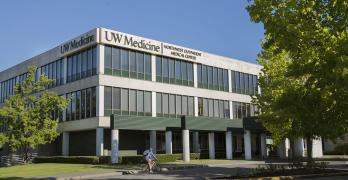Rheumatology
Expert diagnosis and the most advanced treatments of autoinflammatory and autoimmune conditions

Bone, muscle, joint and autoimmune care to keep you moving.
Convenient Expertise
We offer one-stop care for complex rheumatic diseases. That means access to multiple services within each of our specialty clinics.
Continuing Care
We partner with you during the consultation, evaluation and treatment processes to create a management plan that matches your lifestyle.
Leading Immunodiagnostics
Our active research program means that our state-of-the-art clinical care is informed by innovative scientific investigation.
Some of our common services:
This rare disease causes muscle inflammation and a skin rash, and can affect people of all ages. Symptoms of dermatomyositis can include weak muscles around the neck, shoulders and hips. Our rheumatologists are experts at diagnosing this condition and developing an individualized treatment plan.
Our cutting-edge diagnostic testing, which includes musculoskeletal ultrasound and advanced, precise laboratory tests, complements the wealth of clinical experience that we bring to the care of our patients.
Both gout and pseudogout cause inflamed, painful joints due to the buildup of crystal deposits in the joints. Both conditions can damage joints and mimic the signs and symptoms of osteoarthritis and rheumatoid arthritis. Our rheumatologists can expertly diagnose and treat pseudogout and gout, helping to manage symptoms and prevent future flare-ups.
This condition causes pain and swelling in a joint due an infection, sometimes systemic but usually localized to the joint itself. Our rheumatologists can accurately diagnose this condition and treat it with targeted medication and, sometimes, a specialized procedure. Because infectious arthritis isn't a chronic condition, it generally resolves with appropriate care.
Arthritis and other inflammatory conditions can cause pain and discomfort within joints throughout the body. Joint pain can be mild or it can be severe and disabling. If you experience joint pain, we can develop an individualized treatment plan to help reduce your discomfort and allow you to live as fully as possible.
This is a rare disease of the blood vessels that causes inflammation in the small and medium-sized blood vessels throughout the body. It typically affects the sinuses, lungs and kidneys, as well as other organs. Our rheumatologists are experts at diagnosing this condition, helping to slow its progression, and treating its symptoms.
This is muscle inflammation that can cause muscle weakness and, in some cases, a skin rash. It can occur as the result of an injury, infection or an autoimmune disease. Our rheumatologists can accurately identify this condition and any underlying health problems, and treat it using a variety of advanced methods.
This is the most common form of arthritis. It's a long-term, chronic condition that causes the breakdown of joint cartilage, along with symptoms such as joint pain and stiffness and reduced mobility. Our rheumatologists can expertly diagnose this condition and treat it with a variety of medications, lifestyle recommendations, therapies and procedures.
If you’ve been diagnosed with osteoporosis or osteopenia, it can be helpful to work with a physical therapist to develop an individual exercise plan and to make sure you’re exercising safely. UW Medicine's expert physical therapists have experience working with individuals diagnosed with or at risk for osteoporosis.
Osteoporosis is a thinning of bone mass. Osteoporosis and osteopenia, or low bone density, affect 55% of people over age 50 in the U.S., most of whom are women. The disease can significantly increase the risk of fractures, especially hip, wrist and compression fractures of the spine.
Exercise can help build bone mass and reduce the risk of fractures, but it must be appropriate for each person and the degree of bone loss or other health conditions.
As part of UW Medicine's osteoporosis services, our licensed physical therapists will evaluate:
Your posture
Your overall musculoskeletal system
Body mechanics (the way you move your body)
Your balance
Based on this evaluation, they will design an exercise plan specifically for you and show you how to perform your exercises safely. You will also learn about minimizing your risk of fractures during everyday activities.
If you are involved in a gym program or community exercise program such as yoga or tai chi, we will also give you guidance to help you avoid potential injury or risk of fracture. If you have difficulty with balance, you will be given exercises to perform and suggestions for safe practices to reduce your risk of falling. A physician's referral is required.
This is a type of arthritis that affects five or more joints at the same time, with symptoms that include joint pain and stiffness, a rash and fatigue. Our rheumatologists are highly trained at diagnosing polyarthritis, treating symptoms and controlling the condition to prevent further injury to the body.
This inflammatory disorder causes muscle pain and stiffness, usually in the shoulders and around the hips. It typically affects adults over the age of 50 and is related to a more serious inflammatory condition called giant cell arterisis. Our rheumatologists can accurately diagnose polymyalgia rheumatica and help manage it with targeted medication.
This is a rare inflammatory disorder in which abdominal organs and vessels become blocked by excess fibrous tissue in the back of the abdomen. Early symptoms include dull pain in the stomach or back. Our rheumatologists can accurately diagnose this condition and provide effective treatment to prevent complications such as kidney failure.
This long-term, chronic autoimmune disease causes inflammation of the joints. In some cases, it's severe enough to limit mobility, disfigure joints and affect other parts of the body such as the heart and lungs. Our specialists are adept at diagnosing RA and developing a treatment plan to help reduce pain, slow disease progression and help you retain function.
This chronic disease causes abnormal growth of connective tissue and can affect the joints, skin and internal organs. It can sometimes lead to interstitial lung disease (ILD). Our rheumatologists are experts at diagnosing and treating scleroderma and other autoimmune diseases associated with ILD.
This autoimmune condition causes dry eyes and a dry mouth, and often accompanies other autoimmune disorders such as rheumatoid arthritis and lupus. Our specialists are highly skilled at identifying Sjögren's syndrome and treating symptoms with targeted medications and minor surgery.
This is a group of inflammatory rheumatic diseases that cause a unique form of arthritis in the sites where ligaments and tendons attach to bone. Symptoms can include pain and stiffness, often of the spine, as well as bone destruction. Our rheumatologists are highly skilled at diagnosing this condition and helping to manage it.
This is a type of arthritis that affects the spine, causing inflammation of its large joints. It results in stiffness and pain, and sometimes joint erosion and bone fusion. Our rheumatologists can diagnose AS and develop an individualized treatment plan to reduce pain, prevent deformities and help you live as fully as possible.
This is a type of arthritis linked with psoriasis, a chronic skin and nail disease. Symptoms include joint pain and swelling, usually in the fingers and toes.
This is a type of arthritis that occurs as the result of a systemic infection such as chlamydia or salmonella. Symptoms include joint pain and inflammation, usually in the feet, knees or ankles. Our rheumatologists can expertly identify this condition and provide advanced, effective treatment options.
Vasculitis is a group of uncommon autoimmune diseases that cause inflammation of the blood vessels. The inflammation can reduce blood flow to various parts of the body, damaging organs. Vasculitis varies in severity and symptoms, but most types of this disease respond well to treatment, especially when caught early.
In this disease, the immune system attacks blood vessels, causing them to become swollen and inflamed. Symptoms, which include sores on the skin, arthritis, vision impairment and blindness, come and go as the disease flares up. Our specialists can expertly diagnose Behcet disease and help manage symptoms using topical and oral medications.
This condition, which affects only older adults, causes swelling and thickening of arteries in the head and neck. The most common symptom is a persistent headache, but vision can be affected in some cases. Because proper treatment for GCA can prevent permanent blindness, we offer a rapid assessment program for people suspected of having this condition.
This is a rare disease of the blood vessels that causes inflammation in the small and medium-sized blood vessels throughout the body. It typically affects the sinuses, lungs and kidneys, as well as other organs. Our rheumatologists are experts at diagnosing this condition, helping to slow its progression, and treating its symptoms.


